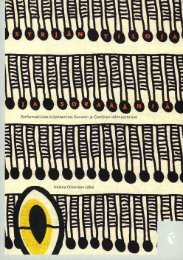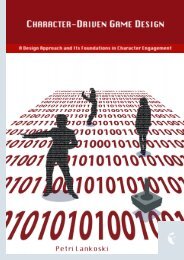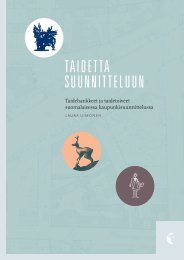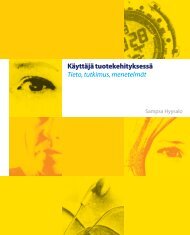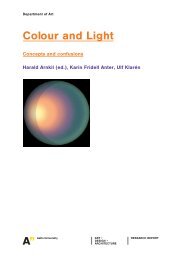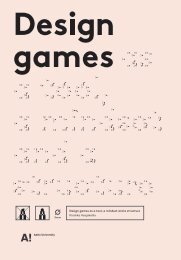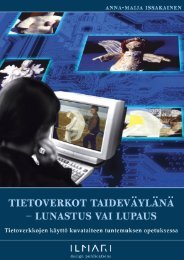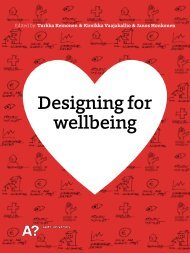Co-experience: Understanding user experiences in social interaction
Co-experience: Understanding user experiences in social interaction
Co-experience: Understanding user experiences in social interaction
You also want an ePaper? Increase the reach of your titles
YUMPU automatically turns print PDFs into web optimized ePapers that Google loves.
oth a subjective and objective view to collaborative <strong>experience</strong>, emotion, and<br />
<strong>in</strong>teraction.<br />
When design<strong>in</strong>g <strong>in</strong>teractive systems, it is critical to understand the <strong>social</strong> and<br />
collaborative aspects of <strong>in</strong>teraction and <strong>experience</strong>. We have found that several<br />
of the more fruitful research methods <strong>in</strong>clude <strong>in</strong>troduc<strong>in</strong>g concepts, products,<br />
and prototypes <strong>in</strong>to the <strong>user</strong>’s world through studies and participatory design<br />
activities. Prototyp<strong>in</strong>g <strong>in</strong>cludes any and all of the design representations of a<br />
potential solution for the purposes of learn<strong>in</strong>g subjectively and objectively<br />
about those who will use the product. While traditional knowledge ga<strong>in</strong>ed from<br />
prototypes has focused on the product function and <strong>in</strong>terface, we have found<br />
prototypes to be very useful for learn<strong>in</strong>g about what <strong>social</strong> <strong>in</strong>teractions and<br />
co-<strong>experience</strong>s can potentially unfold.<br />
CONCLUSION<br />
168 4 PRESENTING THE ARTICLES<br />
<strong>Understand<strong>in</strong>g</strong> <strong>experience</strong> is an exceed<strong>in</strong>gly critical issue for those tasked with<br />
design<strong>in</strong>g <strong>in</strong>teractive systems. <strong>Understand<strong>in</strong>g</strong> <strong>user</strong> <strong>experience</strong> – how people <strong>in</strong>teract<br />
with products, other people and the result<strong>in</strong>g emotions and <strong>experience</strong><br />
that unfold – will result <strong>in</strong> products and systems that improve the lives of those<br />
who use them. Interactive systems for work use can benefit from a more <strong>experience</strong>-oriented<br />
approach, but for new technologies with no immediate perfect<br />
use, the <strong>experience</strong> oriented approach is the only real way that <strong>user</strong> centered<br />
design can impact the technology push. By understand<strong>in</strong>g <strong>experience</strong>, mean<strong>in</strong>gful<br />
and experiential applications can be found for technology as well.<br />
Our research has led to a common way to understand <strong>experience</strong>, and to<br />
understand how <strong>social</strong> <strong>in</strong>teraction and collaborative product use <strong>in</strong>fluence the<br />
<strong>in</strong>dividual’s product <strong>experience</strong>s and the mean<strong>in</strong>gs those <strong>experience</strong>s come to<br />
have. In this paper, we offer an understand<strong>in</strong>g of the <strong>experience</strong>s of the <strong>in</strong>dividual<br />
and co-<strong>experience</strong> as a sensitiz<strong>in</strong>g concept to help <strong>in</strong> <strong>in</strong>terpret<strong>in</strong>g mean<strong>in</strong>g<br />
from a <strong>social</strong> <strong>in</strong>teraction perspective. This process needs to be visual, empathic,<br />
and emotionally driven to be ultimately successful <strong>in</strong> support<strong>in</strong>g <strong>in</strong>spiration<br />
and ga<strong>in</strong><strong>in</strong>g <strong>in</strong>sights <strong>in</strong>to <strong>user</strong> <strong>experience</strong>.<br />
ACKNOWLEDGMENTS<br />
This research was partially funded by NSF IIS 0121426 as well as the Academy<br />
of F<strong>in</strong>land. Thank you to Ilpo Kosk<strong>in</strong>en and Carl DiSalvo for comments. Thanks<br />
also to Jacob Buur, Tuuli Mattelmäki, Vesa Jääskö and Salu Ylirisku, as well as<br />
other Luota<strong>in</strong> project people for an <strong>in</strong>spir<strong>in</strong>g workshop collaboration.




